Introduction
Suva in Fiji is more than just the country’s capital — it is the beating heart of the South Pacific. Nestled on the southeastern coast of Viti Levu, Fiji’s largest island, Suva is a vibrant blend of tradition and modernity. While most travelers are drawn to Fiji for its pristine beaches and island resorts, those who venture into Suva discover a completely different side of the country — one rich in history, culture, and authentic local experiences.
The city is home to Fiji’s political institutions, business centers, museums, and cultural landmarks, making it not only a hub of governance but also of daily life in Fiji. With its bustling markets, lush gardens, colonial buildings, and lively festivals, Suva offers an experience that contrasts with the resort-focused holiday many visitors expect.
This blog post dives deep into everything you need to know about Suva in Fiji — from its history and culture to top attractions, cuisine, festivals, and travel tips — giving you all the reasons why Suva deserves a spot in your itinerary.
Overview of Suva
Geographic Location and Climate
Suva is located on the southeast coast of Viti Levu, the largest of Fiji’s 300+ islands. Unlike the dry western side of the island, Suva enjoys a lush, tropical rainforest climate. This means it is green year-round, with frequent rainfall that keeps the city’s gardens and surrounding forests flourishing.
The climate here is typically warm and humid, with temperatures ranging between 23°C and 30°C throughout the year. Rainfall is heavier from November to April, which coincides with the cyclone season, while May to October offers cooler, drier conditions.
For travelers, the best time to visit Suva in Fiji is during the dry season, when the weather is pleasant, and outdoor activities can be enjoyed without constant interruptions from rain showers. However, the wet season also has its charm, as waterfalls and rivers in the surrounding areas are at their most spectacular.
History
Suva’s history is as fascinating as its present-day vibrancy. Long before it became Fiji’s capital, the land was home to Indigenous Fijians who thrived through fishing, farming, and trading with neighboring island communities. Suva was chosen as the capital in 1882, when the colonial administration shifted the seat of government from Levuka on Ovalau Island. The move was made because Suva offered more space for expansion, better harbor access, and potential for modern infrastructure.
During the colonial era, Suva developed into a city shaped by both European and local influences. Its wide streets, government buildings, and cathedrals reflected colonial tastes, while its markets and neighborhoods remained deeply rooted in Indigenous and Indo-Fijian traditions. This blend of cultures still defines Suva today.
Over the decades, Suva in Fiji has grown into a regional powerhouse. It is not only the political capital but also a cultural and educational hub, hosting universities, museums, and regional organizations like the Pacific Islands Forum. The city represents Fiji’s progress, while still holding onto its traditional roots.
Culture and Lifestyle
What sets Suva apart from many other Pacific capitals is its rich cultural diversity. The city is home to a mix of Indigenous Fijians, Indo-Fijians, Chinese, Europeans, and Pacific Islanders from neighboring nations. This multicultural identity is reflected in Suva’s food, festivals, and everyday life.
The main languages spoken in the city are English (the official language), Fijian, and Hindi. For visitors, this makes communication easy, as English is widely used in business, education, and tourism. However, hearing conversations in Fijian and Hindi adds to the multicultural experience.
Suva’s lifestyle is a vibrant mix of tradition and modernity. On one side, you’ll find locals wearing traditional attire during cultural ceremonies or church gatherings. On the other, the city has lively nightlife spots, modern shopping malls, and a growing café culture.
Despite being the capital, Suva retains the warmth of a small island community. Hospitality is central to Fijian culture, and visitors often find themselves welcomed with genuine smiles and offers of kava, the traditional drink made from the root of the yaqona plant.
Main Tourist Attractions
Suva in Fiji might not have the resort-lined beaches of Nadi or the luxury islands of Denarau, but what it offers is a cultural and urban experience that reveals the country’s real heartbeat. The city is filled with historical landmarks, lush parks, lively markets, and vibrant streets that give visitors an authentic look into daily Fijian life. Below are the main attractions in Suva that every traveler should explore.
Fiji Museum
One of the most important cultural attractions in Suva is the Fiji Museum, located within Thurston Gardens. This museum offers a deep dive into Fiji’s history, from its earliest human settlement to its colonial past and modern-day society.
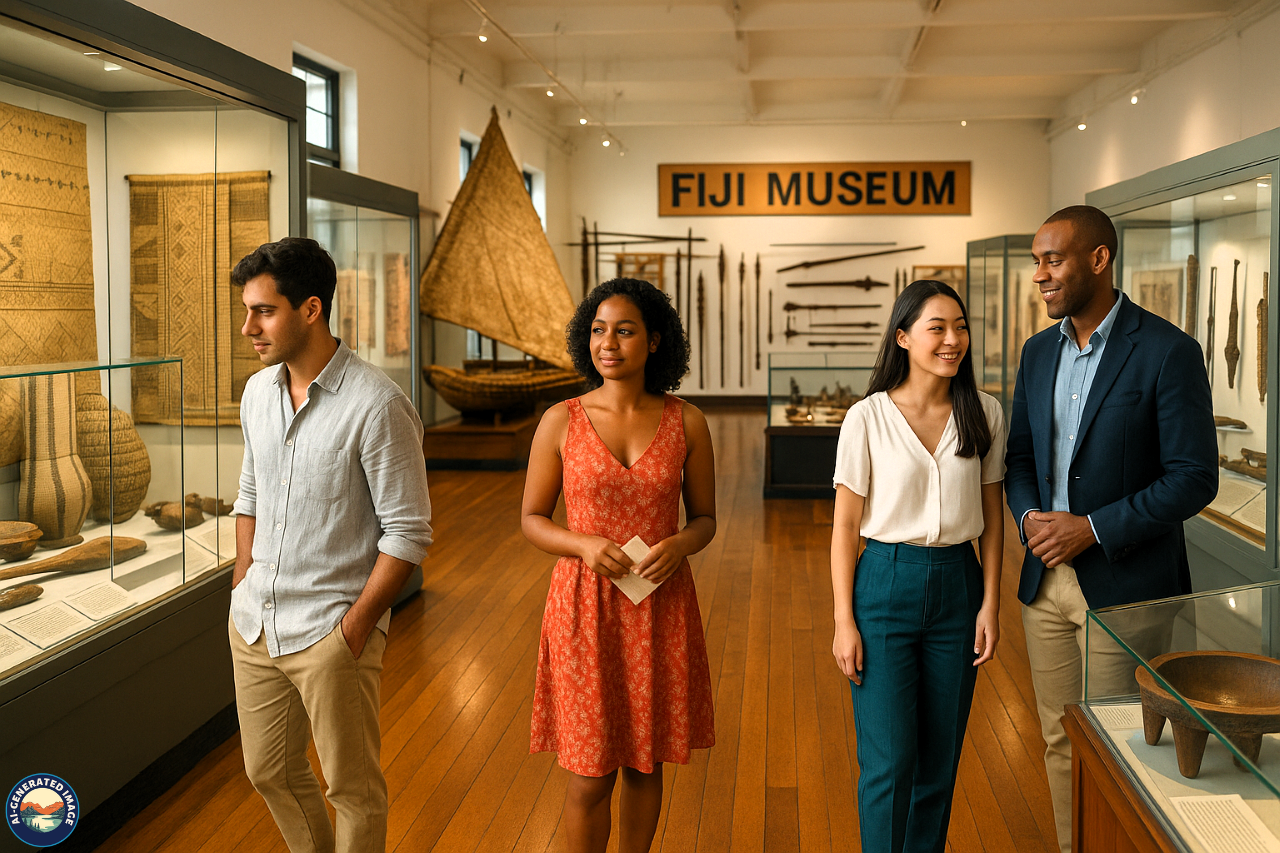
Inside, visitors can explore exhibits showcasing artifacts that date back more than 3,700 years, including pottery from the Lapita people — the ancestors of modern Pacific Islanders. One of the highlights is the famous Ratu Finau canoe, a massive traditional drua (double-hulled canoe) that once sailed the Pacific Ocean.
The museum also provides insight into Fiji’s darker history, such as cannibalism and the conflicts of the 19th century. Colonial-era displays, Indo-Fijian cultural contributions, and rotating exhibitions on contemporary art make it a must-see for anyone wanting to understand Fiji beyond its beaches.
Thurston Gardens
Right outside the Fiji Museum lies Thurston Gardens, a peaceful botanical escape in the heart of Suva. These gardens were established in the late 19th century and named after Sir John Bates Thurston, a former governor of Fiji.
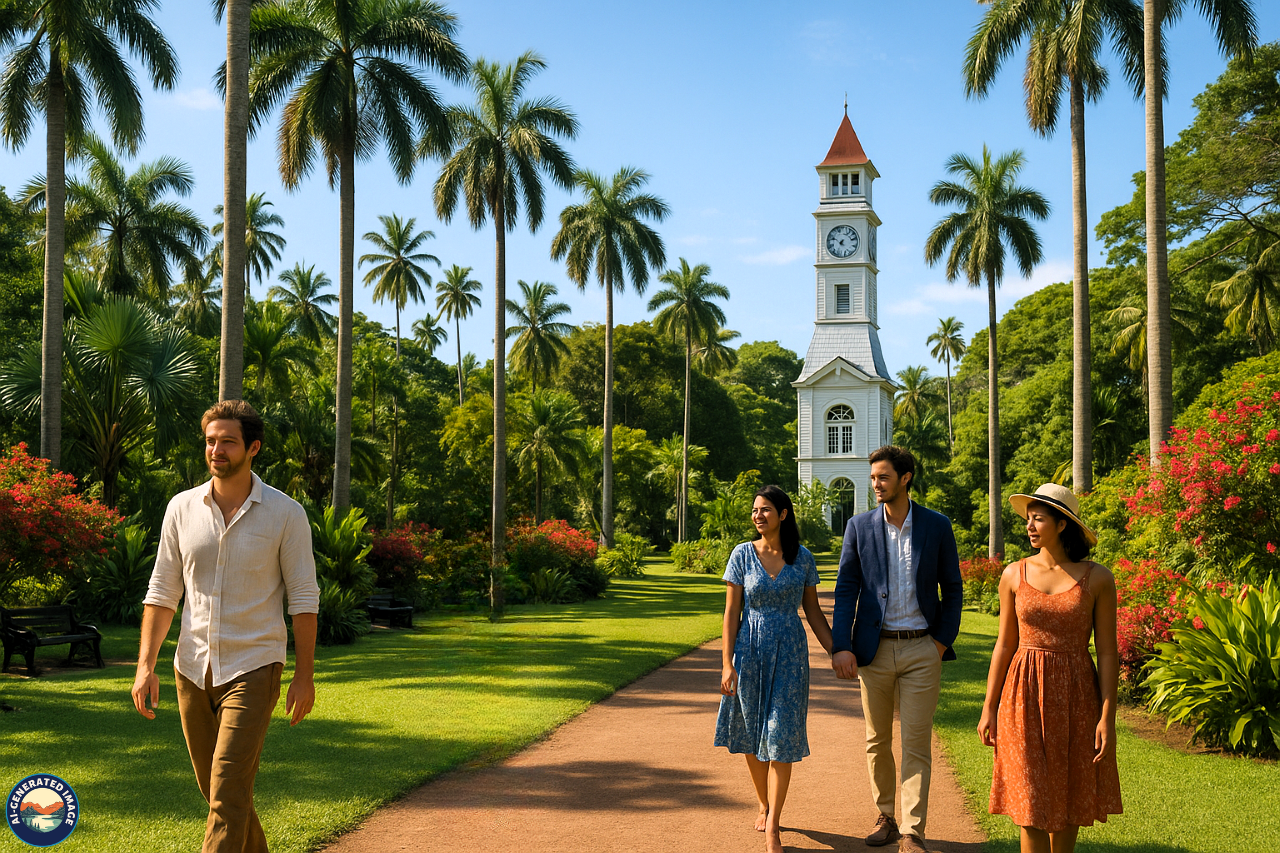
The gardens feature an impressive collection of tropical plants, palms, and trees, many of which are native to the Pacific. A colonial-style clock tower adds charm to the surroundings, and walking paths invite visitors to take a stroll away from the city’s busy streets.
Thurston Gardens are especially popular for photography, picnics, and quiet reflection. They also host occasional cultural events, making them both a scenic and social hub in Suva.
Suva Municipal Market
If you want to feel the true pulse of Suva, head straight to the Suva Municipal Market. Located near the harbor, this bustling marketplace is where locals shop for everything from tropical fruits and vegetables to seafood, spices, and flowers.
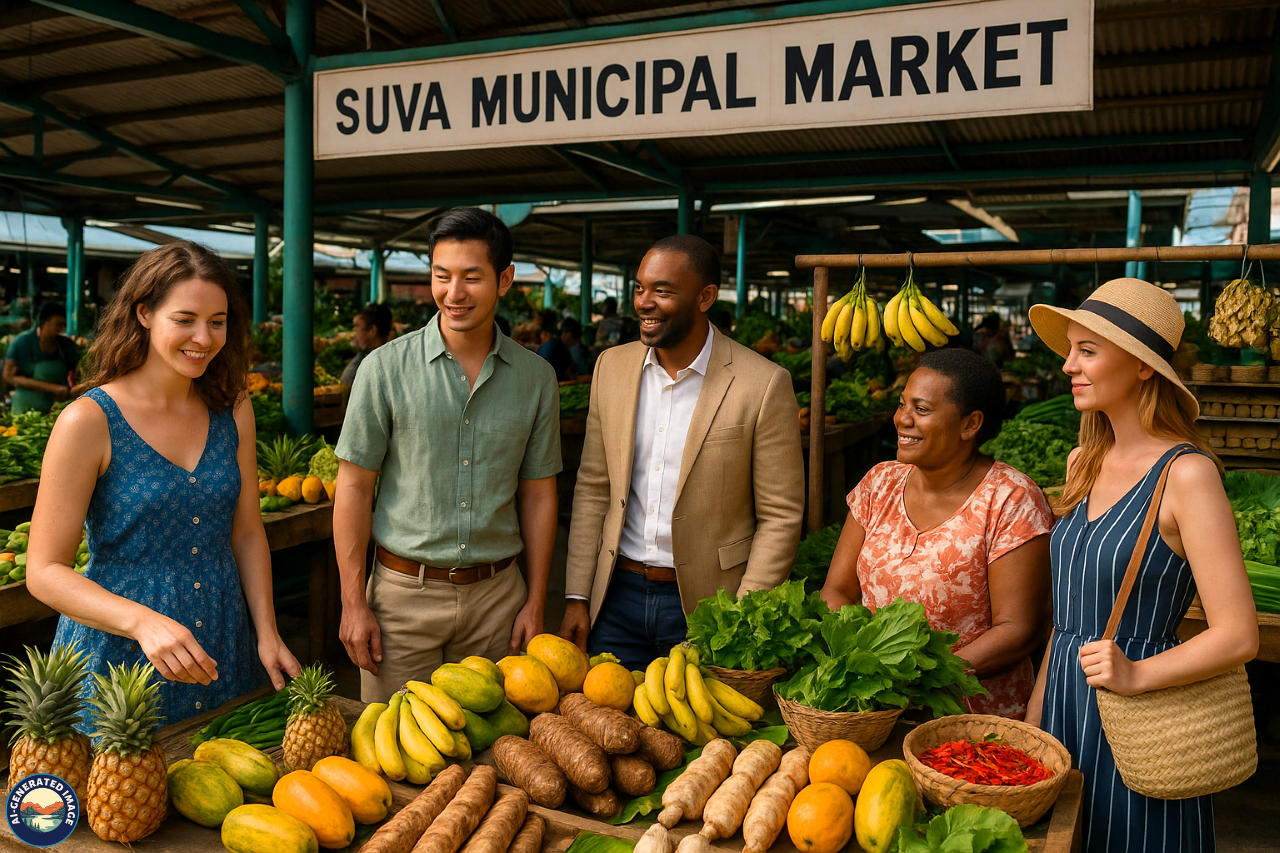
The market is an explosion of colors and aromas. You’ll find heaps of pineapples, papayas, bananas, taro, and cassava, alongside unique offerings like kava roots and fresh chilies. Indo-Fijian spice stalls add a rich aroma to the air, while handicraft sellers often set up outside, selling souvenirs and woven mats.
This market is more than just a shopping destination — it’s a cultural experience. Tourists can interact with vendors, sample local produce, and observe the vibrant social life of Fijians going about their daily routines.
Colo-i-Suva Forest Park
Just a 15-minute drive from downtown Suva lies Colo-i-Suva Forest Park, a tropical rainforest reserve spread over 2.5 square kilometers. This park is a complete contrast to the city’s urban setting and offers an escape into lush greenery, hiking trails, and waterfalls.
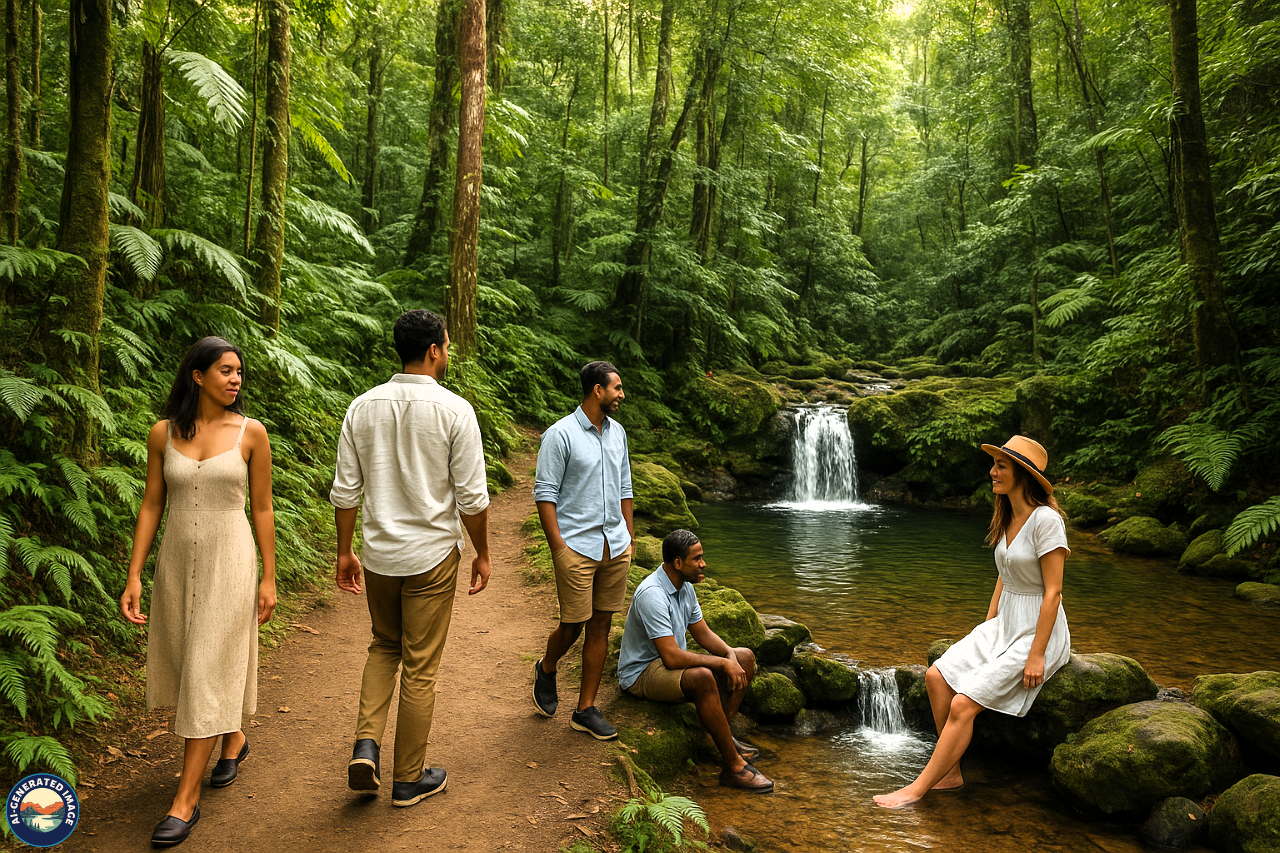
The park is known for its walking tracks, some short and easy, others longer and more challenging. Along the way, visitors can swim in natural pools, enjoy cascading waterfalls, and spot local wildlife such as colorful parrots, kingfishers, and native plants.
For nature lovers, Colo-i-Suva is a paradise. The park’s cool atmosphere is refreshing, especially after exploring Suva’s busy streets. Birdwatchers in particular will find it rewarding, as the area is home to many native and migratory bird species.
Suva Seawall and Albert Park
The Suva Seawall is a popular spot for evening strolls, morning jogs, and casual relaxation. Stretching along the coastline, it provides sweeping views of Suva Harbor and the surrounding hills. It’s also a great place to mingle with locals, as families, students, and office workers often gather here at the end of the day.
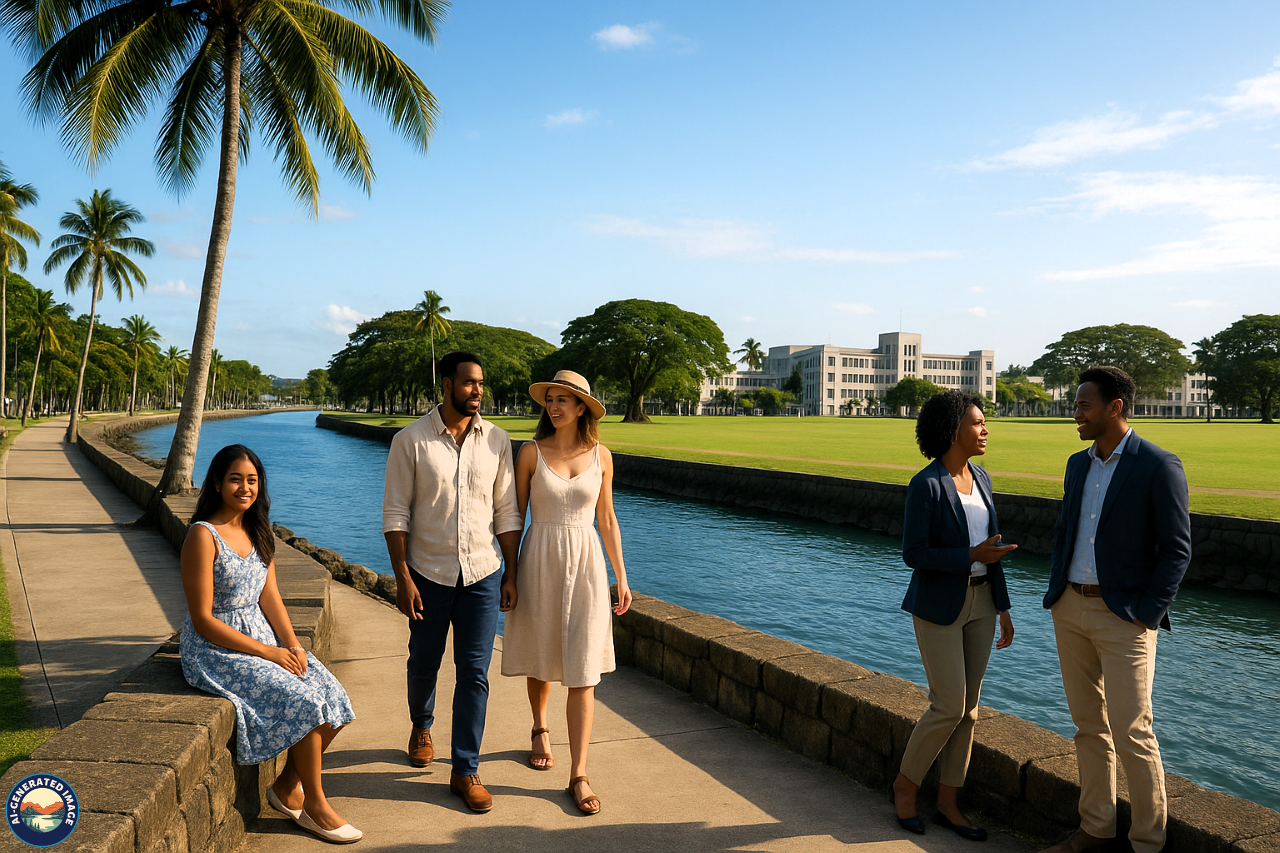
Nearby lies Albert Park, a landmark with historical and cultural significance. This park has hosted everything from royal visits to rugby matches. It was famously the location where Charles Kingsford Smith landed his aircraft, the Southern Cross, during the first trans-Pacific flight in 1928. Today, it serves as a venue for festivals, parades, and sporting events.
Sacred Heart Cathedral
For architecture enthusiasts, the Sacred Heart Cathedral is a must-visit. Built in the early 20th century, the cathedral reflects the colonial-era influence of European missionaries. Its striking design, with stained glass windows, tall spires, and a grand interior, makes it one of Suva’s most photographed landmarks.
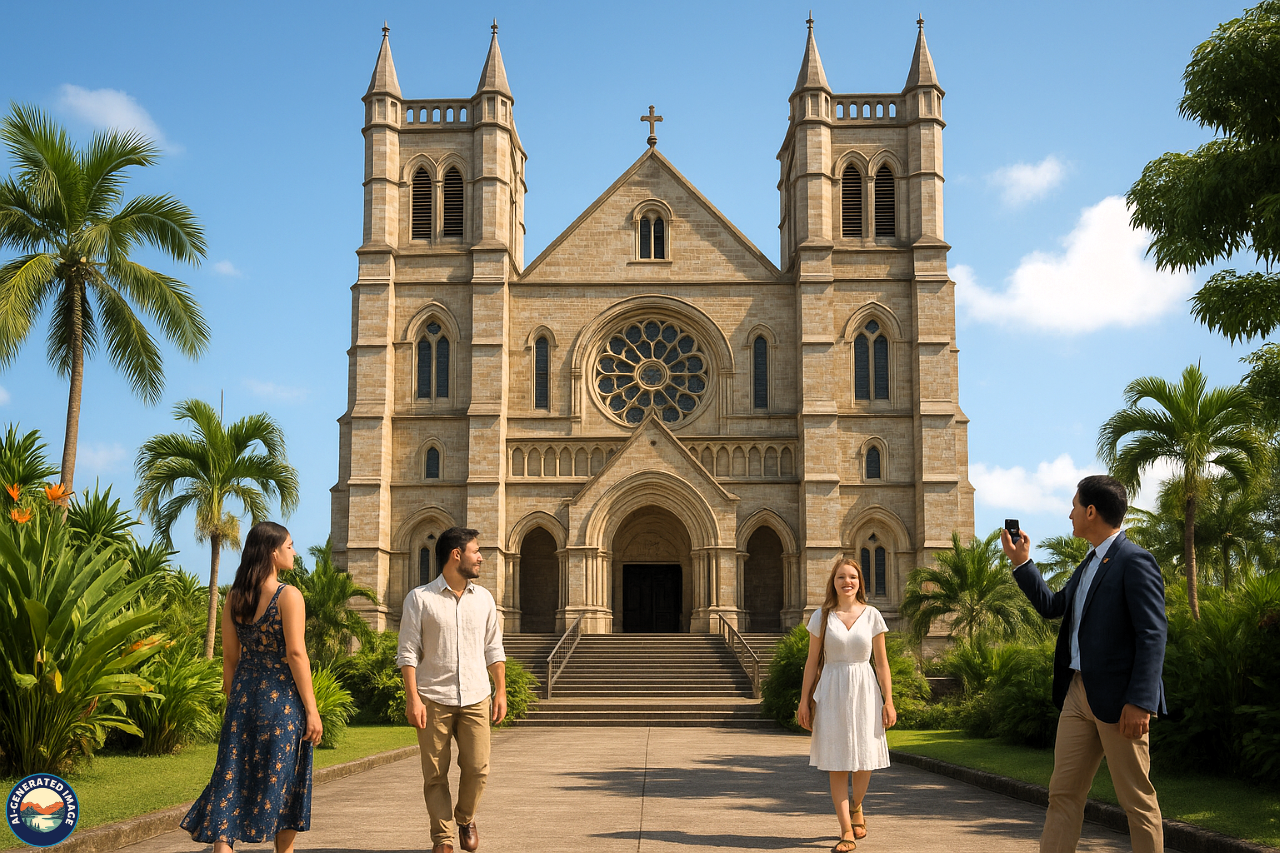
The cathedral remains an active place of worship and is central to Suva’s Catholic community. Tourists are welcome to visit outside service times, where they can admire the quiet elegance of its architecture.
Parliament of Fiji and Government Buildings
As the capital city, Suva is home to the country’s key political institutions. The Parliament of Fiji and nearby Government Buildings are iconic sites that showcase Suva’s role as Fiji’s political heart.
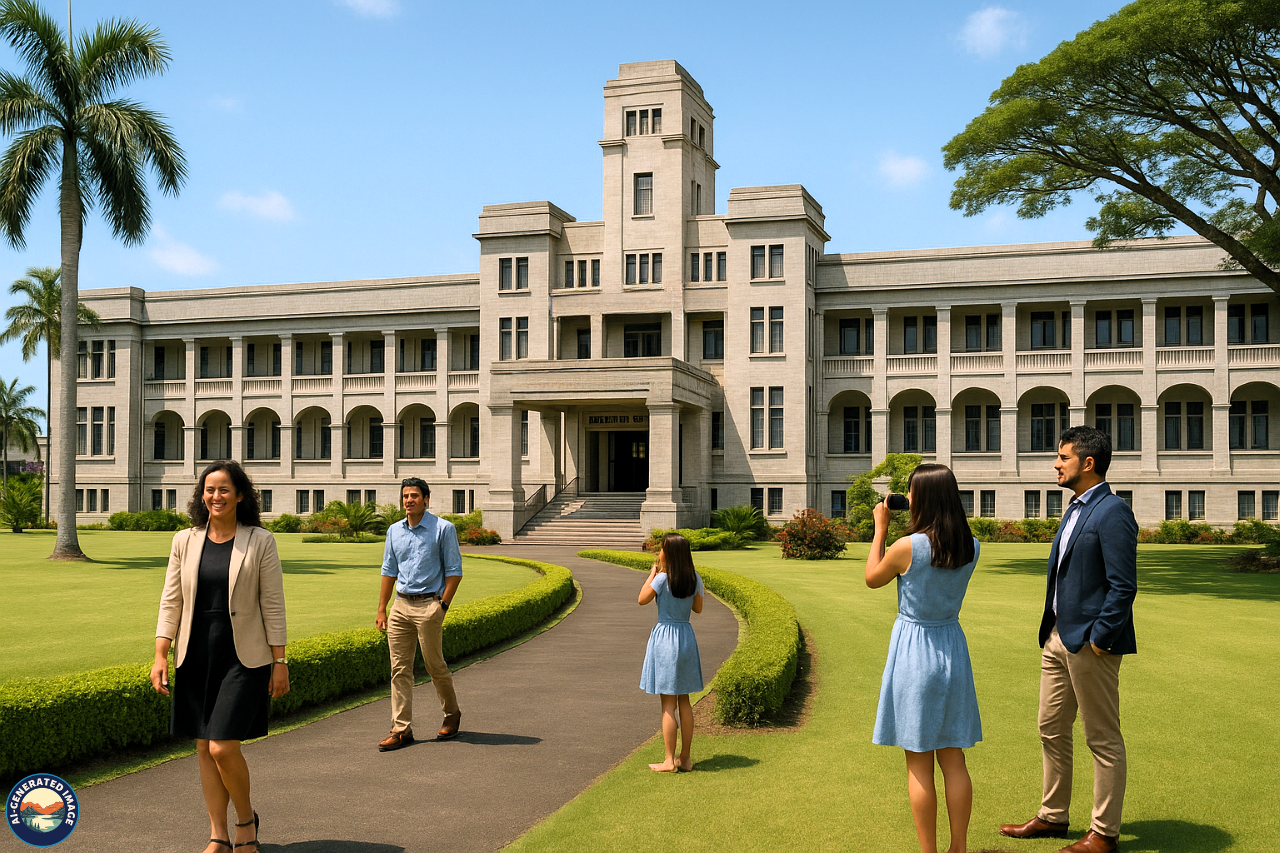
The government buildings, with their colonial architecture, stand out against the backdrop of Suva’s modern structures. Guided tours are sometimes available for visitors who wish to learn more about Fiji’s governance and history.
Even if you don’t go inside, strolling around this district offers an interesting glimpse into the city’s administrative life and provides plenty of photo opportunities.
Things to Do in Suva
Suva in Fiji offers far more than sightseeing. Beyond its attractions, the city is alive with cultural events, vibrant markets, modern shopping centers, and lively entertainment. For travelers who want to go beyond the usual tourist path, Suva provides plenty of experiences that reveal both its traditional heart and contemporary spirit.
Cultural Experiences
One of the most rewarding things about visiting Suva is the opportunity to immerse yourself in its rich cultural tapestry. Unlike Fiji’s resort towns, Suva provides authentic encounters with the country’s multicultural identity.
A must-see experience is a meke performance, a traditional Fijian dance that combines storytelling, song, and rhythmic movements. Performances are often organized during festivals, special events, or in cultural centers, giving visitors a glimpse of Fiji’s oral traditions. Each meke tells a story — whether of love, war, or legends — and is accompanied by chanting and drumming.
Visitors can also explore handicraft markets, where local artisans sell woven mats, carved wooden bowls, and jewelry made from shells and coconut. These crafts are not just souvenirs but symbols of Fiji’s heritage, each item reflecting skills passed down through generations.
For those interested in religion and spirituality, attending a Sunday church service in Suva is another cultural highlight. Fijians are known for their powerful choral singing, and many travelers describe the experience as deeply moving.
Shopping
Suva is the commercial capital of Fiji, so it’s no surprise that shopping here is both diverse and exciting. Unlike the smaller towns, Suva offers everything from bustling local markets to modern malls.
For an authentic experience, head to Suva Handicraft Centre, where dozens of stalls showcase local art and crafts. This is the perfect spot to pick up souvenirs such as tapa cloth (barkcloth with traditional designs), hand-carved bowls, and woven baskets. Prices are negotiable, so don’t hesitate to bargain politely.
For modern shopping, Tappoo City and MHCC (Morris Hedstrom City Centre) are two of the most popular malls in the city. These shopping centers feature international brands, electronics, fashion outlets, and food courts. They also provide a comfortable escape from Suva’s tropical heat.
Another highlight for shopaholics is the Suva Municipal Market, which we covered earlier. Besides fresh produce, the market has sections where you can find traditional medicines, kava, and spices that reflect the Indo-Fijian influence.
Nightlife and Entertainment
When the sun sets, Suva comes alive with a vibrant nightlife scene. Unlike the resort towns where nightlife is often centered around hotels, Suva’s entertainment options are spread across the city, ranging from laid-back bars to lively nightclubs.
For a casual evening, you can start at one of the city’s kava bars, where locals gather to share bowls of the traditional drink. Kava is made from the root of the yaqona plant and has mild sedative effects. Drinking kava is more about social bonding than intoxication, and joining a session is a great way to experience Fijian hospitality.
For something livelier, Suva has plenty of clubs and bars that feature live music, DJs, and dance floors. Places like Traps, O’Reilly’s, and Down Under are well-known nightlife spots where locals and tourists mingle.
Suva also has a growing live music scene, with bands playing reggae, Pacific beats, and contemporary pop. If you prefer something more relaxed, many cafés and restaurants feature live acoustic sessions in the evenings.
Day Trips from Suva
One of the advantages of basing yourself in Suva is its proximity to other exciting destinations. While the city itself is filled with attractions, you can also take day trips to nearby areas for adventure and relaxation.
Pacific Harbour is just about a 45-minute drive from Suva and is often called the “Adventure Capital of Fiji.” Here, thrill-seekers can enjoy activities like river rafting, jet skiing, and shark diving in the nearby Beqa Lagoon. For a more cultural experience, the Arts Village in Pacific Harbour hosts firewalking demonstrations and meke performances.
Beqa Lagoon is another highlight for divers. Known worldwide for its shark dives, it offers the chance to encounter species like bull sharks and reef sharks up close. Even if you’re not into diving, snorkeling in the lagoon reveals vibrant coral reefs and marine life.
For nature lovers, a visit to Namosi Highlands is worth considering. Located inland from Suva, this area is filled with lush valleys, rivers, and traditional Fijian villages. Guided tours provide opportunities for hiking, river tubing, and cultural exchanges with local communities.
These day trips allow visitors to balance Suva’s urban vibe with Fiji’s natural beauty and adventure opportunities.
Food and Cuisine
Food is one of the best ways to understand a destination, and Suva in Fiji is no exception. Thanks to its multicultural population, the city’s food scene is a flavorful mix of Indigenous Fijian traditions, Indo-Fijian spices, and international influences. From street food at bustling markets to fine dining at upscale restaurants, Suva offers something for every taste.
Traditional Fijian Cuisine
At the heart of Suva’s culinary identity is traditional Fijian cuisine, which is deeply connected to the land and sea. Meals often feature ingredients such as taro, cassava, breadfruit, fish, coconut, and leafy greens.
One of the most iconic dishes is kokoda, Fiji’s version of ceviche. This refreshing dish consists of raw fish marinated in lime juice and coconut cream, often garnished with onions, tomatoes, and chilies. Kokoda is light yet flavorful and is a must-try for first-time visitors.
Another culinary highlight is the lovo feast, a traditional method of cooking food in an underground earth oven. Root crops, meats, and fish are wrapped in banana leaves and slow-cooked over hot stones. The result is a smoky, tender, and aromatic spread of flavors that perfectly represents communal Fijian dining.
Staple foods such as cassava, dalo (taro), and ota (young fern shoots) often accompany meals. These ingredients are simple but nutritious and showcase how Fijians make the most of what their land provides.
Indo-Fijian Influences
The Indo-Fijian community has had a significant impact on Suva’s food culture, and their presence is especially evident in the city’s vibrant, spice-filled cuisine. Indian indentured laborers brought their culinary traditions to Fiji in the late 19th century, and today, Indo-Fijian food is an integral part of Suva’s identity.
Dishes such as curry with roti, dhal soup, and spiced chickpeas are everyday staples in Suva. These meals are affordable, widely available, and packed with flavor. Unlike Indian curries, Indo-Fijian curries often feature more coconut milk and locally sourced vegetables, giving them a tropical twist.
Street vendors and local eateries often serve samosas, bhajiyas (fried vegetable fritters), and barfi (a sweet treat made from condensed milk and sugar). These snacks are popular for a quick bite and highlight how Indo-Fijian food has blended seamlessly into the local lifestyle.
Where to Eat
Suva has a diverse dining scene that caters to all kinds of travelers, from those looking for authentic local dishes to those who prefer international cuisine.
-
Local Eateries and Markets:
-
For budget-friendly options, head to the Suva Municipal Market or small roadside stalls where you can try traditional Fijian meals and Indo-Fijian curries at affordable prices. Eating at local joints also offers the chance to connect with Suva’s residents and experience everyday dining.
-
Restaurants and Cafés:
-
Suva is home to several well-reviewed restaurants such as Tiko’s Floating Restaurant, which offers seafood served on a boat, and Eden Bistro & Bar, known for its fusion cuisine and relaxed atmosphere. Other popular options include Maya Dhaba (for North Indian food) and Ashiyana (a long-standing favorite for Indian curries).
-
Fine Dining and International Cuisine:
-
For travelers seeking something upscale, Suva also offers international choices. The Grand Pacific Hotel, an iconic colonial-era building, houses restaurants that blend local flavors with global influences. Italian, Chinese, and Japanese restaurants can also be found across the city.
-
Cafés and Coffee Culture:
-
Suva’s café scene is growing rapidly, with cozy spots offering coffee, pastries, and light meals. These cafés are often frequented by students, young professionals, and travelers looking for a relaxing break during the day.
Whether you’re indulging in a lovo feast, enjoying Indo-Fijian street snacks, or dining in style at a waterfront restaurant, the food in Suva is an essential part of the city’s charm.
Festivals and Events
One of the best ways to experience the culture of Suva in Fiji is by attending its festivals and events. The capital is the cultural heart of the nation, and throughout the year it hosts a range of celebrations that reflect the city’s multicultural identity. From traditional Fijian ceremonies to Indo-Fijian festivities and modern entertainment events, Suva is alive with energy and color.
Hibiscus Festival
The Hibiscus Festival is perhaps the most famous cultural event in Suva and is often described as the “mother of all festivals” in Fiji. First established in the 1950s, it has grown into one of the biggest annual celebrations in the country.
Held over a week in August, the festival combines tradition, entertainment, and community spirit. The highlight of the festival is the Hibiscus Queen pageant, where contestants from across Fiji compete in talent shows, fashion displays, and cultural performances. Beyond the pageant, the festival grounds buzz with parades, food stalls, music, and amusement rides.
The Hibiscus Festival is not just entertainment; it’s a platform where social issues are also addressed. Contestants and organizers often use the event to raise awareness on topics like education, health, and the environment. For visitors, attending the Hibiscus Festival offers a chance to see Fijian culture in full swing — vibrant, diverse, and inclusive.
Diwali and Holi
Thanks to Suva’s large Indo-Fijian community, Diwali and Holi are celebrated with great enthusiasm in the city.
Diwali, the Hindu Festival of Lights, usually takes place in October or November. During this time, homes, temples, and streets in Suva are lit with oil lamps and colorful decorations. Families prepare traditional sweets, exchange gifts, and come together for prayers and celebrations. For visitors, Diwali in Suva is an enchanting experience, as the city glows with lights and the aroma of spiced treats fills the air.
Holi, the Festival of Colors, is another vibrant celebration, usually held in March. Participants gather in open spaces, throwing colored powders and water at each other in joyous celebration. Music, dancing, and festive meals accompany the event, creating a lively atmosphere that reflects Suva’s Indo-Fijian heritage.
Christmas and New Year
Suva in Fiji celebrates Christmas with warmth and enthusiasm, reflecting the strong Christian traditions of the Indigenous Fijian community. Churches host special services, choirs sing carols, and families come together for festive meals. Decorations in the city, particularly in shopping centers and hotels, create a joyful holiday spirit.
New Year’s Eve is another lively event, with fireworks displays, concerts, and parties taking place around the city. Many locals and tourists gather along the Suva seawall to watch the fireworks over the harbor, while hotels and clubs host countdown events with music and dancing.
Fijian Cultural Ceremonies
Beyond public festivals, Suva offers visitors the chance to witness or take part in traditional Fijian cultural ceremonies. These include:
-
Kava ceremonies, where guests are welcomed with the traditional drink made from the root of the yaqona plant. The ritual follows a formal process that includes chanting, clapping, and respectful gestures.
-
Meke performances, which combine dance, song, and storytelling to preserve Fijian legends and history.
-
Village visits, where tourists can engage with local communities, learning about customs, crafts, and traditional cooking methods.
These ceremonies emphasize community, respect, and hospitality — values at the core of Fijian culture.
Other Celebrations and Events
Suva is also home to various other celebrations that reflect the diversity of its people:
-
Chinese New Year is marked by Suva’s Chinese community with lion dances, fireworks, and festive meals.
-
University of the South Pacific events often bring together international students, showcasing Pacific Island traditions through cultural nights, dance shows, and exhibitions.
-
Sports events, especially rugby matches at the ANZ National Stadium, attract huge crowds and highlight the passion Fijians have for their national sport.
Together, these events demonstrate the multicultural vibrancy of Suva and give visitors a chance to see how traditions from different communities coexist harmoniously in one city.
Practical Travel Information
Planning a trip to Suva in Fiji is not just about choosing attractions; it also involves understanding how to get there, how to move around the city, where to stay, and how to make the most of your time safely and comfortably. Suva is well-connected and offers a range of options for different types of travelers, whether you’re backpacking, traveling with family, or seeking luxury.
How to Reach
Most international travelers arrive in Fiji through Nadi International Airport, located on the western side of Viti Levu. From Nadi, Suva is about 200 kilometers away and can be reached by air, bus, or car.
-
By Air:
-
The quickest way is to take a domestic flight from Nadi to Nausori International Airport, which is located about 23 kilometers (a 30–40 minute drive) from Suva. Regular flights operated by Fiji Airways and other carriers connect the two cities, making it the most convenient choice for those short on time.
-
By Road:
-
For those who want to enjoy the scenic journey, traveling by road from Nadi to Suva takes around 4–5 hours. The Queen’s Road runs along Fiji’s southern coast, offering views of beaches, villages, and mountains along the way. It’s a great introduction to the landscapes of Fiji.
-
By Bus:
-
Several bus companies operate between Nadi and Suva, providing affordable and comfortable travel. These buses often have air-conditioning and make stops at key towns en route.
Getting Around Suva
Once in the capital, getting around is relatively easy:
-
Public Buses:
-
Suva’s bus system is the most affordable way to move around the city. Buses are frequent and connect the central bus terminal with neighborhoods, suburbs, and nearby areas.
-
Minibuses:
-
These are smaller, privately run vehicles that operate along fixed routes. They are faster than public buses but slightly more expensive.
-
Taxis:
-
Taxis are widely available and reasonably priced. Most are metered, but it’s best to confirm before starting your journey. For short trips within the city, taxis are convenient and reliable.
-
Walking:
-
Suva’s central area is compact and walkable. Many attractions such as Thurston Gardens, the Fiji Museum, and Suva Municipal Market are within easy walking distance of each other.
-
Car Rental:
-
Renting a car is another option if you plan to explore beyond Suva, particularly places like Pacific Harbour, Beqa Lagoon, or Namosi Highlands. Roads are generally in good condition, though driving can be a bit challenging in busy city traffic.
Accommodation
Suva offers accommodation for every type of traveler, from luxury hotels to budget-friendly guesthouses.
-
Luxury Hotels:
-
The Grand Pacific Hotel (GPH) is the most iconic luxury option in Suva. Built in 1914 and recently restored, it combines colonial charm with modern amenities. Other luxury hotels include Holiday Inn Suva, which offers waterfront views and business facilities.
-
Mid-Range Hotels:
-
Options like Tanoa Plaza Hotel and Capricorn Apartment Hotel provide comfortable stays with good facilities at reasonable rates. They are popular with both business and leisure travelers.
-
Budget Accommodation:
-
Backpackers and budget travelers can choose from affordable hostels and guesthouses. Places like City Private Hotel and Island Accommodation Suva offer simple but clean lodging close to the city center.
-
Homestays and Airbnb:
-
For those who want a more personal experience, homestays and Airbnb properties are also available. Staying with locals provides insight into daily life in Suva.
Safety and Travel Tips
While Suva in Fiji is generally safe for travelers, it’s always wise to take precautions:
-
Safety in the City:
-
Petty theft, such as pickpocketing, can occur in crowded areas like markets or bus terminals, so keep an eye on your belongings. Avoid walking alone late at night in poorly lit areas.
-
Cultural Respect:
-
Fijians are friendly and welcoming, but respect for local customs is important. When visiting villages, modest dress is expected, and it’s polite to remove hats before entering homes or community spaces.
-
Money Matters:
-
Fiji’s currency is the Fijian Dollar (FJD). ATMs are widely available in Suva, and credit cards are accepted in most hotels, restaurants, and shops. Carrying some cash is useful for local markets and smaller establishments.
-
Health Precautions:
-
Tap water in Suva is generally safe to drink, but bottled water is widely available if you prefer. Sun protection is essential — carry sunscreen, hats, and water when exploring.
-
Transport Tips:
-
If using taxis, make sure the meter is switched on or agree on a fare before starting the ride. For intercity travel, booking bus tickets in advance is recommended during peak periods.
By keeping these tips in mind, travelers can enjoy a smooth and rewarding stay in Suva while focusing on its cultural, historical, and natural offerings.
Suva’s Role in Fiji’s Identity
While many travelers see Suva simply as a stopover on their journey through Fiji, the city is far more than that. Suva in Fiji is not only the country’s political capital but also its cultural and intellectual heart. The city plays a central role in defining Fiji’s national identity, balancing tradition with modernity and local character with global influence.
Political and Economic Significance
As the capital, Suva is the seat of Fiji’s government. The Parliament of Fiji, presidential offices, and government ministries are all located in the city, making it the center of national decision-making. Suva is also home to diplomatic missions and international organizations such as the Pacific Islands Forum Secretariat, reinforcing its position as a regional hub in the South Pacific.
Economically, Suva is one of Fiji’s most important urban centers. The city’s port handles a significant share of the country’s imports and exports, and its commercial districts are filled with banks, offices, and shopping complexes. Industries such as shipping, retail, education, and public administration provide jobs to thousands of people in the capital.
The presence of the University of the South Pacific (USP) in Suva also enhances its reputation as an intellectual hub. USP attracts students from across the Pacific Islands, contributing to both the city’s economy and its cosmopolitan character.
Cultural Influence
Culturally, Suva is a melting pot. The city brings together Indigenous Fijian traditions, Indo-Fijian heritage, Chinese influences, and contributions from other Pacific communities. This diversity is celebrated in festivals, cuisine, arts, and music.
Suva’s theaters, galleries, and cultural centers foster creativity. For example, the Fiji Arts Council promotes local artists, while performance spaces regularly host dance, drama, and musical shows. Events like the Hibiscus Festival and university cultural nights highlight the pride locals have in their multicultural identity.
Through its museums, gardens, and historic landmarks, Suva also preserves and promotes Fiji’s heritage. This balance between tradition and modern life helps shape how Fijians view themselves and how they present their culture to the world.
Blend of Modernity and Tradition
One of Suva’s most striking qualities is how it blends modern infrastructure with traditional values. On one side, the city has modern malls, office towers, universities, and entertainment venues. On the other hand, visitors can still experience authentic Fijian customs, such as kava ceremonies, handicraft markets, and traditional dances.
In the city center, colonial-era government buildings stand alongside glass-clad office blocks, symbolizing the coexistence of history and progress. While Suva embraces modernity, its people remain deeply rooted in communal traditions and respect for their ancestors.
This balance gives Suva a unique personality. It’s not just a tropical capital but also a place where Pacific culture evolves in harmony with global trends. For travelers, it means they can enjoy both worlds — sipping coffee at a modern café in the morning and attending a traditional meke dance performance in the evening.
Conclusion
Suva in Fiji is often overshadowed by the country’s resort islands and pristine beaches, but for those who make the journey to the capital, it offers an equally rewarding experience — and arguably more authentic. Suva is where Fiji’s heart beats the loudest, combining history, politics, culture, and everyday life into one dynamic city.
As the country’s capital, Suva plays a vital role in shaping Fiji’s national identity. It is where important political decisions are made, where regional diplomacy takes place, and where economic activity thrives. Yet, beyond its status as a center of governance and commerce, Suva is also a cultural melting pot. Here, visitors can witness the seamless blend of Indigenous Fijian traditions, Indo-Fijian heritage, and global influences.
Tourists will find no shortage of experiences in Suva. The Fiji Museum and Thurston Gardens provide a glimpse into the nation’s past, while the Suva Municipal Market immerses you in daily life through its colors, flavors, and aromas. Nature lovers can escape to the Colo-i-Suva Forest Park, while history enthusiasts can explore colonial-era landmarks and government buildings. Add to this the vibrant nightlife, multicultural food scene, and lively festivals like the Hibiscus Festival, and it’s clear that Suva offers something for everyone.
More than anything, what sets Suva apart is its authenticity. This is not the Fiji of glossy travel brochures, but the Fiji that locals live every day. In Suva, you can share a bowl of kava with new friends, wander through bustling markets, and witness the warmth of Fijian hospitality in its purest form.
For travelers who want to understand Fiji beyond its beaches, Suva is a destination that cannot be missed. It’s a city where tradition meets modernity, where cultures coexist harmoniously, and where the real Fiji reveals itself in vibrant detail.
So, when planning your trip to Fiji, don’t just fly through Suva on your way to the islands. Stay a while, explore its attractions, and experience the unique character of the capital. Suva in Fiji may surprise you — and it will stay with you long after you’ve left.
FAQs
To help travelers plan their trip with ease, here are answers to some of the most frequently asked questions about Suva in Fiji.
What is Suva famous for?
Suva is famous for being the capital of Fiji and the South Pacific’s largest city. It’s known for its vibrant multicultural atmosphere, colonial architecture, bustling markets, lush Thurston Gardens, and cultural attractions like the Fiji Museum.
Is Suva worth visiting compared to Nadi or Denarau?
Yes, Suva is worth visiting. While Nadi and Denarau are resort-centered with easy access to beaches, Suva offers a more authentic and cultural experience. It’s the best place to see Fiji’s everyday life, history, and traditions.
How many days should I spend in Suva?
Ideally, spend 2–3 days in Suva. This gives you enough time to explore key attractions such as the Fiji Museum, Colo-i-Suva Forest Park, and Suva Market, and enjoy cultural experiences like kava ceremonies or festivals.
What is the best time of year to visit Suva?
The best time to visit Suva is during the dry season (May to October), when the weather is cooler and less rainy. However, Suva is lush and green year-round, so visiting during the wetter months also has its charm.
Is Suva safe for tourists?
Suva is generally safe, but like any city, it’s important to take precautions. Avoid walking alone at night in poorly lit areas, keep valuables secure, and be cautious in crowded spaces like markets. During the day, Suva is friendly and welcoming.
What are the must-try foods in Suva?
Some must-try foods include kokoda (marinated raw fish in coconut cream), lovo feasts (traditional underground cooking), and Indo-Fijian dishes such as curry with roti. Don’t miss trying street snacks like samosas and bhajiyas.
Can I take day trips from Suva to nearby islands or beaches?
Yes, Suva is a great base for day trips. Popular options include Pacific Harbour (for adventure activities), Beqa Lagoon (for diving and shark encounters), and Namosi Highlands (for hiking and cultural village tours).
What festivals can tourists experience in Suva?
The biggest is the Hibiscus Festival, held annually in August. Tourists can also experience Diwali, Holi, Christmas celebrations, and traditional cultural ceremonies such as kava rituals and meke dances.
Where is the best place for shopping in Suva?
For authentic souvenirs, visit the Suva Handicraft Centre and Suva Municipal Market. For modern shopping, Tappoo City and MHCC are popular malls offering international brands, food courts, and fashion outlets.
How do I get from Suva to Nadi?
You can travel from Suva to Nadi by:
-
Bus: Affordable and comfortable, taking 4–5 hours along the scenic Queen’s Road.
-
Car/Taxi: Driving also takes 4–5 hours and allows flexibility for stops.
-
Domestic Flight: A short flight from Nausori International Airport to Nadi is the fastest option.
Final Thoughts
Suva in Fiji is a city that surprises many visitors with its cultural depth, lively markets, rich history, and natural escapes. Whether you’re exploring its museums, shopping in its markets, relaxing in its gardens, or joining a kava ceremony, Suva offers an authentic experience that goes beyond the beaches and resorts.
For travelers who want to connect with Fiji’s true spirit, spending time in Suva is not just worthwhile — it’s essential.
